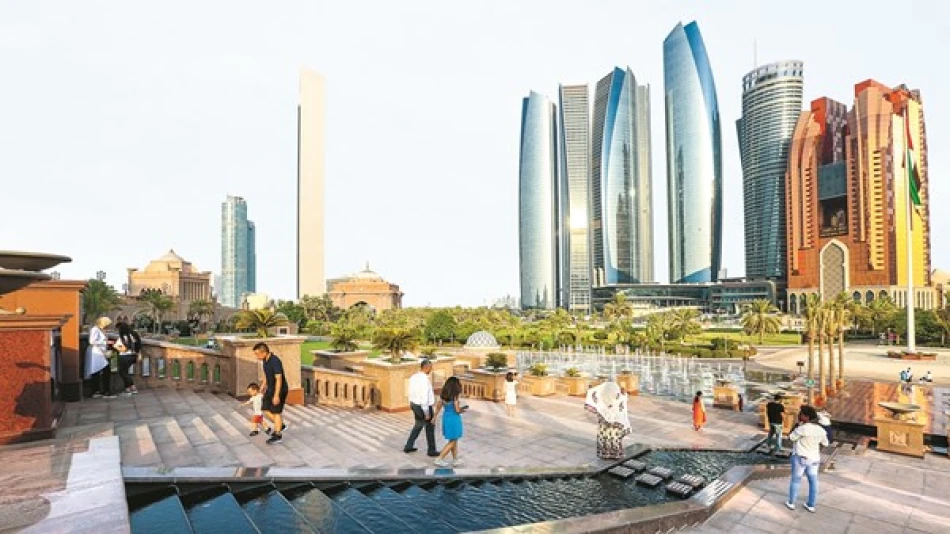
Abu Dhabi Hotels Generate AED 3.82 Billion in 5-Month Revenue Surge
Abu Dhabi's Hotel Boom Signals Middle East Tourism Renaissance
Abu Dhabi's hospitality sector is experiencing a remarkable surge, with hotel revenues jumping 20% to AED 3.82 billion in the first five months of 2025, signaling the emirate's successful transformation into a global tourism powerhouse. This growth trajectory positions Abu Dhabi as a serious competitor to established destinations like Dubai and Singapore, while demonstrating the UAE's broader economic diversification strategy beyond oil dependency.
Strong Performance Across All Metrics
The latest data from Abu Dhabi Statistics Centre reveals impressive momentum across key hospitality indicators. Hotels welcomed 2.43 million guests during January-May 2025, maintaining steady visitor numbers while dramatically improving revenue per guest. This suggests a strategic shift toward premium tourism rather than volume-based growth.
Monthly occupancy rates remained robust throughout the period, averaging 81% - a figure that would be enviable in most global markets. February recorded the highest occupancy at 86%, while March saw the lowest at 69%, likely reflecting seasonal patterns typical of Gulf destinations.
Revenue Diversification Beyond Room Sales
May's revenue breakdown offers insight into Abu Dhabi's evolving hospitality model. Of the AED 682 million generated, AED 408 million came from room sales, AED 224 million from food and beverage operations, and AED 50 million from ancillary services. This 60-33-7 split indicates healthy diversification, with F&B contributing significantly more than the global average of 25-30%.
Asia Drives Visitor Growth Strategy
The visitor demographics reveal Abu Dhabi's successful pivot toward Asian markets. Non-Arab Asian visitors topped the list with 155,000 guests in May alone, followed by Europeans at 112,000. This Asian focus mirrors Singapore's tourism strategy and reflects the UAE's growing economic ties with China, India, and Southeast Asia.
Notably, domestic tourism contributed 88,000 visitors, suggesting strong local confidence in Abu Dhabi's hospitality offerings - a positive indicator for sustained growth even during potential global downturns.
Infrastructure Scaling to Meet Demand
Abu Dhabi's hotel infrastructure has expanded to 172 properties offering 34,383 rooms by May 2025. This controlled growth approach contrasts with Dubai's rapid expansion model, potentially allowing for better quality control and occupancy optimization.
The emirate's strategy appears focused on premium positioning rather than mass market appeal, evident in the revenue-per-guest improvements despite modest visitor number increases.
Ambitious Growth Projections Signal Confidence
Abu Dhabi's Department of Culture and Tourism projects total hotel revenues will reach AED 8.6 billion in 2025, representing 13% growth from 2024's AED 7.6 billion. This follows an impressive 22% surge in 2024, indicating sustained momentum rather than a temporary bounce-back.
More significantly, tourism's contribution to Abu Dhabi's economy is expected to grow from AED 55 billion in 2024 to AED 62 billion in 2025, with an ambitious target of AED 90 billion by 2030. This represents a 64% increase over five years - an aggressive but potentially achievable goal given current trends.
Regional Competition and Global Context
Abu Dhabi's performance occurs amid intensifying competition in Middle Eastern tourism. Saudi Arabia's massive Vision 2030 investments in NEOM and other projects, Qatar's post-World Cup tourism push, and Dubai's continued expansion create a challenging environment.
However, Abu Dhabi's focus on cultural tourism, business travel, and premium experiences may provide sufficient differentiation. The emirate's investments in museums, cultural districts, and business infrastructure support this positioning strategy.
Investment Implications and Economic Impact
For investors, Abu Dhabi's hospitality growth represents broader UAE economic health and diversification success. The consistent growth across multiple metrics suggests sustainable demand rather than speculative bubbles.
The tourism sector's expanding economic contribution - projected to reach 15% of Abu Dhabi's GDP by 2030 - indicates successful economic diversification that reduces oil dependency. This transformation enhances the emirate's resilience against commodity price volatility and positions it for long-term growth in the global experience economy.
Most Viewed News

 Layla Al Mansoori
Layla Al Mansoori






